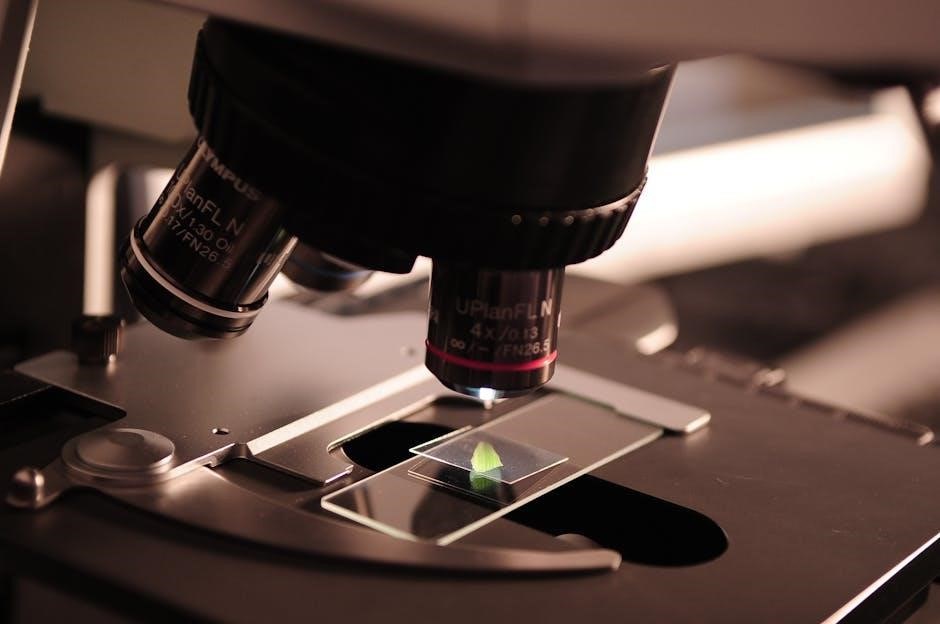The TEAS Science Study Guide is a comprehensive resource for exam preparation, covering biology, chemistry, physics, and anatomy. It offers detailed explanations, practice questions, and strategies to help students master essential concepts and achieve success.
Overview of the TEAS Exam
The TEAS exam, or Test of Essential Academic Skills, is a standardized test assessing a student’s readiness for healthcare and nursing programs. It evaluates knowledge in reading, mathematics, science, and English language skills. The science section, a critical component, focuses on biology, chemistry, physics, and anatomy/physiology. The exam consists of 170 multiple-choice questions, with a 209-minute time limit. A strong performance demonstrates a student’s understanding of foundational concepts and their ability to apply them in real-world scenarios. Preparation is key, as the TEAS exam is a gateway to many academic opportunities. Utilizing study guides, such as the TEAS Science Study Guide, can significantly enhance exam readiness and confidence.
Importance of the Science Section in the TEAS Exam
The science section of the TEAS exam is a cornerstone for assessing foundational knowledge in biology, chemistry, physics, and anatomy/physiology. It evaluates critical thinking, problem-solving, and the ability to apply scientific concepts to real-world scenarios. Performing well in this section is crucial for students pursuing healthcare careers, as it demonstrates their readiness to understand complex medical concepts. A strong science foundation not only enhances academic performance but also prepares students for the demands of professional training. Utilizing resources like the TEAS Science Study Guide can help students master these essential skills and build confidence for exam day. Effective preparation ensures a solid understanding of scientific principles and their practical applications.

Key Topics Covered in the TEAS Science Study Guide
The guide covers biology, chemistry, physics, and anatomy/physiology, focusing on fundamental principles, key concepts, and scientific inquiry skills to enhance understanding and test readiness.
Biology: Key Concepts and Terminology
The TEAS Science Study Guide thoroughly covers biology, emphasizing cell structure, genetics, evolution, and ecosystems. It includes terminology like photosynthesis, mitosis, and DNA replication, ensuring a solid foundation for understanding biological processes. Key concepts such as energy flow, nutrient cycles, and biodiversity are also explored in depth. Students will gain clarity on complex topics through detailed explanations and practice questions, helping them prepare for the exam with confidence. The guide also highlights the importance of scientific inquiry and laboratory techniques, providing a well-rounded approach to mastering biology. By focusing on these essential areas, the study guide equips learners with the knowledge needed to excel in the TEAS Science section.
Chemistry: Fundamental Principles and Applications
The TEAS Science Study Guide delves into chemistry, focusing on foundational concepts like atomic structure, chemical bonding, and the periodic table. It explores principles such as stoichiometry, thermodynamics, and chemical reactions, providing clear explanations and practical examples. Key topics include states of matter, solutions, and pH, ensuring a strong understanding of chemical interactions. The guide also emphasizes real-world applications, such as chemistry in medicine and environmental science. By mastering these principles, students can confidently tackle chemistry-related questions on the TEAS exam. The study guide’s structured approach ensures comprehensive preparation, making complex topics accessible and easy to understand. This section is essential for building a solid chemistry knowledge base.
Physics: Core Ideas and Problem-Solving Strategies
The TEAS Science Study Guide thoroughly covers physics, emphasizing core concepts such as mechanics, energy, and motion. It provides detailed explanations of key principles like Newton’s laws, forces, and work. The guide also explores topics such as thermodynamics, waves, and electricity, ensuring a well-rounded understanding. Problem-solving strategies are a focal point, with step-by-step approaches to tackling complex questions. Students learn how to identify key variables, apply formulas, and interpret results effectively. These strategies not only enhance comprehension but also improve time management during the exam. By mastering these physics concepts and techniques, students can confidently approach even the most challenging questions in this section. The guide’s clear, structured format makes learning physics accessible and straightforward.
Anatomy and Physiology: Major Systems and Processes
The TEAS Science Study Guide delves into the intricate structures and functions of the human body, focusing on major systems like the skeletal, muscular, nervous, and circulatory systems. It provides detailed explanations of how these systems interact to maintain homeostasis and overall health. Key processes such as cellular respiration, digestion, and blood circulation are explored in depth. The guide also emphasizes the importance of understanding anatomical terminology and physiological mechanisms. Students learn how to identify and describe the components of each system, as well as their roles in maintaining bodily functions. Practical examples and diagrams help clarify complex concepts, making it easier for learners to grasp and retain the material. This section is essential for building a strong foundation in anatomy and physiology.
Study Strategies for Mastering TEAS Science
Effective strategies include setting specific goals, using practice tests, and employing active learning techniques; Prioritize understanding concepts over memorization and allocate time for regular review sessions.
Creating an Effective Study Schedule
Developing a structured study schedule is crucial for mastering the TEAS Science section. Begin by breaking down the exam into manageable sections, such as biology, chemistry, and anatomy. Allocate specific time slots for each subject based on your strengths and weaknesses. Consistency is key; aim to study at the same time daily to build a routine. Use flashcards and practice tests to reinforce concepts and identify areas needing improvement. Schedule regular review sessions to ensure long-term retention. Prioritize understanding over memorization, as this will enhance problem-solving skills. Finally, allow flexibility in your schedule to adapt to progress and challenges, ensuring a balanced and productive study plan.
Using Practice Tests to Identify Weak Areas
Practice tests are an invaluable tool for assessing readiness and pinpointing weaknesses in the TEAS Science section. By simulating exam conditions, these tests help familiarize students with the format and timing. Reviewing results reveals areas where understanding is lacking, allowing focused study on specific topics; Use the provided answer explanations to clarify misconceptions and reinforce learning. Regular practice tests track progress over time, highlighting improvements and persistent challenges. Incorporate this feedback into your study plan to address gaps systematically. Consistent use of practice tests builds confidence and ensures a thorough grasp of the material, making them an essential component of effective TEAS preparation.
Active Learning Techniques for Better Retention
Active learning enhances retention by engaging students beyond passive reading. Techniques include self-quizzing, where students test their knowledge, and elaboration, explaining concepts in their own words. Spaced repetition involves reviewing material at increasing intervals, strengthening memory over time. Interleaved practice mixes topics, improving problem-solving flexibility. Dual coding combines verbal and visual learning, like pairing diagrams with written explanations. Teaching others forces deep understanding, while active recall strengthens memory retrieval. These methods, supported by a free PDF study guide, create a dynamic and effective study routine, ensuring long-term retention of scientific concepts and preparing students confidently for the TEAS exam. Consistent application of these strategies fosters mastery and reduces reliance on rote memorization.

Resources for TEAS Science Preparation
Utilize a free PDF study guide, online tools, and flashcards to enhance your TEAS science preparation. These resources provide comprehensive content, practice tests, and interactive learning aids, ensuring thorough exam readiness while saving costs.
Benefits of Using a Free PDF Study Guide
A free PDF study guide offers numerous advantages for TEAS science preparation. It provides access to comprehensive study materials without financial burden, allowing students to focus on learning rather than costs. The guide is often portable, making it easy to study anywhere and at any time. Additionally, PDF formats frequently include interactive elements such as hyperlinks and bookmarks, enhancing navigation and efficiency. Many resources are updated regularly to reflect exam changes, ensuring students have the most relevant information. Furthermore, sharing capabilities allow collaborative learning among peers. With a structured layout and concise content, a free PDF study guide is an invaluable tool for effective preparation and success on the TEAS exam.
Recommended Online Tools and Websites
Several online tools and websites are highly recommended to complement your TEAS science study guide. Quizlet is an excellent platform for creating and studying flashcards, which can help reinforce key terms and concepts. Khan Academy offers free video tutorials and practice exercises that cover a wide range of science topics. Additionally, Magoosh provides comprehensive practice tests and study materials tailored to the TEAS exam. Websites like ATITesting.com and UnionTestPrep.com offer free study guides and practice questions specifically designed for the TEAS science section. These online resources are invaluable for self-assessment and targeted practice, ensuring you’re well-prepared for exam day. Utilizing these tools alongside your study guide will enhance your learning experience and improve your performance.
Importance of Flashcards and Mnemonics
Flashcards and mnemonics are powerful tools for mastering the TEAS science section. Flashcards help reinforce memory by actively recalling key terms and concepts, making them ideal for subjects like biology, chemistry, and anatomy. Mnemonics, such as acronyms or rhymes, aid in organizing complex information, improving long-term retention. For example, using mnemonics to remember anatomical systems or chemical processes can simplify study sessions. Quizlet is a popular platform for creating digital flashcards, allowing users to test themselves on-the-go. These strategies reduce study time and enhance understanding, making them essential for achieving a high score on the TEAS exam. By incorporating flashcards and mnemonics into your study routine, you can effectively manage the vast amount of scientific knowledge required.

Understanding Test-Taking Strategies
Mastering test-taking strategies is crucial for success on the TEAS exam. Techniques like skimming questions, prioritizing easier ones, and using elimination to reduce stress can enhance efficiency.
How to Approach Multiple-Choice Questions
Approaching multiple-choice questions effectively requires a strategic mindset. Start by skimming the question to understand its intent and identify key terms. Eliminate clearly incorrect options first to reduce confusion. Pay attention to absolute words like “always” or “never,” as these often indicate distractors. Use the process of elimination to narrow down choices, and rely on your knowledge base rather than guessing blindly. Time management is critical—allocate a set amount of time per question to avoid getting stuck. Finally, stay calm and focused, as anxiety can impair decision-making. By combining these techniques, you can optimize your performance and confidently tackle the TEAS Science exam.
Time Management During the Exam
Effective time management is crucial during the TEAS Science exam to ensure you complete all sections. Allocate a specific amount of time to each question, typically 1-2 minutes per question, to maintain a steady pace. Start with questions you find easier to build confidence and save time for challenging ones later. Avoid spending too long on a single question, as this can disrupt your overall rhythm. Use any remaining time to review skipped questions, ensuring you attempt every one. Prioritize accuracy over speed, but remember that guessing strategically can prevent leaving questions unanswered. By adhering to a time plan, you can maximize your score and minimize stress, ensuring a balanced approach throughout the exam.
Reducing Test Anxiety and Staying Focused
Managing test anxiety is essential for optimal performance on the TEAS Science exam. Begin by practicing deep breathing exercises to calm your mind and body before starting. Positive self-talk and visualization of success can help build confidence. Break down the exam into manageable sections, focusing on one question at a time to avoid feeling overwhelmed. Prioritize a consistent study routine and create a distraction-free study environment to enhance focus. Staying organized with a structured study plan and using tools like flashcards can also reduce anxiety. Additionally, simulate test conditions during practice to familiarize yourself with the format, helping you stay composed during the actual exam. Remember, managing anxiety is achievable with the right strategies, allowing you to stay focused and perform at your best.

Final Preparation and Review
The final stage involves reviewing key concepts, completing practice tests, and refining study strategies to ensure readiness for the TEAS Science exam. Stay focused and confident.
Last-Minute Tips for Exam Day
On exam day, ensure you are well-rested and arrive early to avoid unnecessary stress. Bring all required materials, including a valid ID and writing utensils. Skim through your notes briefly but avoid cramming. During the test, manage your time wisely, allocating a set amount to each question. Eliminate obviously incorrect answers first, then make an educated guess if needed. Stay calm and focused, as anxiety can hinder performance. If you encounter a difficult question, move on and return to it later. Review your answers if time permits, ensuring all questions are attempted. Confidence and a clear mind will help you perform at your best.
Staying Healthy and Mentally Prepared
Maintaining physical and mental well-being is crucial for effective TEAS Science preparation. Prioritize a balanced diet, regular exercise, and sufficient sleep to keep your mind sharp. Engage in relaxation techniques like deep breathing or meditation to manage stress. Set realistic goals and celebrate small achievements to maintain motivation. Surround yourself with a supportive environment that fosters focus and reduces distractions. Incorporate short breaks into your study routine to avoid burnout and recharge your energy. A healthy body and mind will enhance your ability to absorb and retain information, ensuring you approach the exam with confidence and clarity. By nurturing both physical and mental health, you create an optimal foundation for success.
The TEAS Science Study Guide is a valuable resource, offering comprehensive coverage of essential topics and practical strategies to enhance learning. It empowers students to approach the exam with confidence and clarity, ensuring they are well-prepared for success.
The TEAS Science Study Guide provides a structured approach to mastering biology, chemistry, physics, and anatomy. It emphasizes understanding fundamental concepts and applying problem-solving techniques. By utilizing practice tests and active learning methods, students can identify weak areas and improve retention. The guide also highlights the importance of staying healthy and mentally prepared for exam day. Flashcards and mnemonics are recommended for efficient studying. Overall, the guide equips students with the tools and strategies needed to excel on the TEAS exam, ensuring they feel confident and prepared to achieve their academic goals. Regular practice and review are key to long-term success. Consistent practice is essential for excelling on the TEAS Science exam. Regularly reviewing concepts and solving practice questions helps reinforce learning and builds confidence. Students are encouraged to set aside dedicated time each day to engage with study materials, such as the free PDF guide, which offers valuable resources and insights. By maintaining a disciplined study routine and staying motivated, individuals can overcome challenges and achieve their goals. Remember, persistent effort and a positive mindset are key to success. Keep practicing, and you will see steady improvement in your understanding and performance.Summarizing Key Takeaways
Encouragement for Continued Practice




